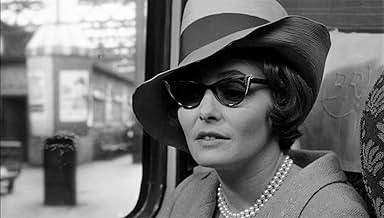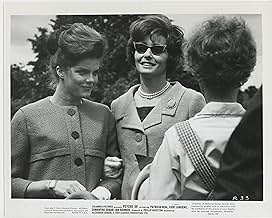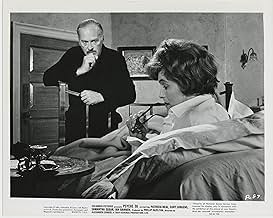In London, the pregnant wife of an industrialist falls down the stairs, loses her sight and has no recollection of the events but suspects that a mentally traumatic experience prior to the f... Read allIn London, the pregnant wife of an industrialist falls down the stairs, loses her sight and has no recollection of the events but suspects that a mentally traumatic experience prior to the fall caused her accident.In London, the pregnant wife of an industrialist falls down the stairs, loses her sight and has no recollection of the events but suspects that a mentally traumatic experience prior to the fall caused her accident.
- Director
- Writers
- Stars
- Nominated for 1 BAFTA Award
- 1 nomination total
Curd Jürgens
- Eric Crawford
- (as Curt Jurgens)
Rex Garner
- Waiter
- (uncredited)
Pat Hagan
- Diner in Restaurant
- (uncredited)
Victor Hagan
- Diner in Restaurant
- (uncredited)
Aileen Lewis
- Lady in Teashop
- (uncredited)
Edward Malin
- Attendant in Men's Room
- (uncredited)
Jack Mandeville
- Man Exiting Lift
- (uncredited)
Louis Matto
- Waiter
- (uncredited)
- Director
- Writers
- All cast & crew
- Production, box office & more at IMDbPro
6.0676
1
2
3
4
5
6
7
8
9
10
Featured reviews
A 1964 hidden goodie - to a point
This film came on Turner Classic Movies recently, with the host mentioning that it was the film's debut on that channel, and the first film Patricia Neal made after winning the Oscar for Hud.
The story concerns a privileged upper-class blind woman named Alison (Neal), her husband Eric (Jurgens) and her younger sister, Robin (Eggar). At first all seems perfectly OK, given the circumstances, but bits of conversation are dropped here and there, darting looks are thrown here and there, and soon we realize that there is something lurking beneath the veneer of a privileged life. Alison, in the final stages of her second pregnancy, suffered a fall in her home that rendered her blind, though as she states early on, it's not that her corneas don't function, it's that her brain won't permit her to see images (paraphrasing here). Apparently this happened in 1959, hence the "'59" in the title: The story then takes place in 1964, five years after this fact, over a time period that seems to be about a month, or maybe two, when Robin re-arrives back into the lives of Eric and Alison after what appears to be a 5-year absence.
The black-and-white cinematography adds much to this film, such that I believe if it were in color, it would not be as effective. The language, dialogue and subject matter covered was ahead of its time, at least by U.S. standards, but stylistically, this matches a number of thrillers and socially-conscious dramas that came out of England in the early- to mid-1960s (e.g., Victim, Pumpkin Eater, etc.).
The first part of the film, set in London, sets up the story beautifully, and it isn't long before we start to realize that something's "up" - the carefully-worded dialogue, with certain key words and phrases omitted, or the glances of the blind Alison behind her sunglasses, to the beat of her words...you see that all that glitters is not gold, so to speak.
The second part of the film takes place at the characters' country house, located near a coastline; It is here that the set-up for what could be a riveting tale, as depicted in the first part of the film, loses steam and slows to a crawl, such that the conclusion is neither climactic nor satisfying; this is a shame, because it could have been done much better. Besides that, I do agree with the comments made by a previous observer, including that the grandmother doesn't seem quite grandmotherly (and actually, I'm sort of confused as to why this character is even in the picture).
Nonetheless, the acting is superb by all the leads, and particularly by Neal, who carries the film, in my opinion. Pay attention to every movement she makes, whether it's with her eyes, her head or her hands; listen intently to every syllable she utters, for it is through her character that we understand the real story of what has happened, or is happening, to these three people.
The movie is based on a book by the same name by Francoise des Ligneris, which is available online.
The story concerns a privileged upper-class blind woman named Alison (Neal), her husband Eric (Jurgens) and her younger sister, Robin (Eggar). At first all seems perfectly OK, given the circumstances, but bits of conversation are dropped here and there, darting looks are thrown here and there, and soon we realize that there is something lurking beneath the veneer of a privileged life. Alison, in the final stages of her second pregnancy, suffered a fall in her home that rendered her blind, though as she states early on, it's not that her corneas don't function, it's that her brain won't permit her to see images (paraphrasing here). Apparently this happened in 1959, hence the "'59" in the title: The story then takes place in 1964, five years after this fact, over a time period that seems to be about a month, or maybe two, when Robin re-arrives back into the lives of Eric and Alison after what appears to be a 5-year absence.
The black-and-white cinematography adds much to this film, such that I believe if it were in color, it would not be as effective. The language, dialogue and subject matter covered was ahead of its time, at least by U.S. standards, but stylistically, this matches a number of thrillers and socially-conscious dramas that came out of England in the early- to mid-1960s (e.g., Victim, Pumpkin Eater, etc.).
The first part of the film, set in London, sets up the story beautifully, and it isn't long before we start to realize that something's "up" - the carefully-worded dialogue, with certain key words and phrases omitted, or the glances of the blind Alison behind her sunglasses, to the beat of her words...you see that all that glitters is not gold, so to speak.
The second part of the film takes place at the characters' country house, located near a coastline; It is here that the set-up for what could be a riveting tale, as depicted in the first part of the film, loses steam and slows to a crawl, such that the conclusion is neither climactic nor satisfying; this is a shame, because it could have been done much better. Besides that, I do agree with the comments made by a previous observer, including that the grandmother doesn't seem quite grandmotherly (and actually, I'm sort of confused as to why this character is even in the picture).
Nonetheless, the acting is superb by all the leads, and particularly by Neal, who carries the film, in my opinion. Pay attention to every movement she makes, whether it's with her eyes, her head or her hands; listen intently to every syllable she utters, for it is through her character that we understand the real story of what has happened, or is happening, to these three people.
The movie is based on a book by the same name by Francoise des Ligneris, which is available online.
A dirty old man and his wrecked family
Patricia Neal makes this film the whole way, although Samantha Eggar as her baby sister also dominates the scenes. Curd Jürgens is the husband of Patricia Neal (Alison) while previous to his marrying her, he had a relationship with the sister, which has left some irreversible marks. Samantha Eggar (Robin) is courted by Ian Bannen (Paul) who wants to marry her, but there is some psychological barrier between them, as he can't really reach her. The problem is that Alison is blind after some trauma, she knows it is psycho-somatic as she went blind when there was something she refused to see, which shocked her out of her wits. Gradually this problem is sorted out. The most interesting part is perhaps the grandmother (Beatrix Lehmann) who probably has seen everything quite clearly from the beginning but consistently keeps a perfect poker face - we never learn what she really knows. The film is made with considerable artifice, it's quite a small drama dragged out to preposterous dimensions by transport stretches, making the film appear much longer than it is. There is a fine moment in the end when Patricia Neal finally opens her eyes and lets in the light, while she virtually leaves everyone else in the darkness of their mess.
Freudian Frolics.
Psyche 59 is directed by Alexander Singer and adapted to screenplay by Julian Zimet from the novel written by Francoise des Ligneris. It stars Patricia Neal, Curd Jurgens, Samantha Eggar, Ian Bannen and Beatrix Lehmann. Music is by Kenneth V. Jones and cinematography by Walter Lassally.
Blind Alison Crawford (Neal) lives with her husband Eric (Jurgens) and finds the equilibrium of life upset when her young sister Robin (Eggar) comes to stay. It seems there are secrets to will out, both with Robin and the matter of how Alison came to be blind.
A strange, almost hypnotic type of movie, Psyche 59 aims to be a Freudian thriller but just misses the mark of being great. The set up is intriguing, the twists risqué and the photography suitably moody. Neal gives a fine performance as the afflicted Alison, both physically and emotionally, Eggar is super sultry and raises the temperatures considerably, while both Bannen and Jurgens are fine considering the former is under written and the latter gets a character arc that's a bit of a stretch. Unfortunately the pay off is hopelessly weak, the whole build up holds the attention, you sense we are heading for great dramatic denouement, but sadly that's not the case and it leaves a disappointing taste in the mouth. 6/10
Blind Alison Crawford (Neal) lives with her husband Eric (Jurgens) and finds the equilibrium of life upset when her young sister Robin (Eggar) comes to stay. It seems there are secrets to will out, both with Robin and the matter of how Alison came to be blind.
A strange, almost hypnotic type of movie, Psyche 59 aims to be a Freudian thriller but just misses the mark of being great. The set up is intriguing, the twists risqué and the photography suitably moody. Neal gives a fine performance as the afflicted Alison, both physically and emotionally, Eggar is super sultry and raises the temperatures considerably, while both Bannen and Jurgens are fine considering the former is under written and the latter gets a character arc that's a bit of a stretch. Unfortunately the pay off is hopelessly weak, the whole build up holds the attention, you sense we are heading for great dramatic denouement, but sadly that's not the case and it leaves a disappointing taste in the mouth. 6/10
Well done performance again by Neal...
I am admittedly biased after seeing her in "The Subject Was Roses", an incredible achievement by Patricia Neal. That being said, this film "Psyche 59" deals with Neal and her seemingly caring husband Curd Jurgens (always believable as middle-aged man, malcontent).
The story starts with Neal in her comfortable London town home, where she is blind due to a tragic accident five years earlier. Her sister Robin (Samantha Eggar) comes to stay with her, which for some reason annoys Jergens. We see the reason clearly as the film unwraps, Eggar's personality as she flirts with her sister's husband. It is rather hard to believe the storyline here that Robin (Eggar) is 17 in this film, as she looks to be about 30 in real life, and manner.
If you can suspend the disbelief a bit (Eggar becomes shrill and annoying at the end, attempting to gain attention from Curt Jurgens).
They stay at the grandmother's country estate for a beach vacation, and the grandmother is , as another reviewer mentioned, rather an extraneous character and its puzzling as to why she has been included in the film, even.
Overall though while the story moves slowly at some points, keep watching for Patricia Neal. She saves the storyline and makes the film well worth your time. Recommended.
The story starts with Neal in her comfortable London town home, where she is blind due to a tragic accident five years earlier. Her sister Robin (Samantha Eggar) comes to stay with her, which for some reason annoys Jergens. We see the reason clearly as the film unwraps, Eggar's personality as she flirts with her sister's husband. It is rather hard to believe the storyline here that Robin (Eggar) is 17 in this film, as she looks to be about 30 in real life, and manner.
If you can suspend the disbelief a bit (Eggar becomes shrill and annoying at the end, attempting to gain attention from Curt Jurgens).
They stay at the grandmother's country estate for a beach vacation, and the grandmother is , as another reviewer mentioned, rather an extraneous character and its puzzling as to why she has been included in the film, even.
Overall though while the story moves slowly at some points, keep watching for Patricia Neal. She saves the storyline and makes the film well worth your time. Recommended.
Almost a masterpiece
"Psyche '59" opened at an art theatre in New York City in 1964. Receiving lukewarm reviews, it closed quickly, and was then used as a co-feature in neighborhood theatres. I consider it a near-masterpiece. Starring Patricia Neal, Curt Jurgens, and Samantha Eggar, it is a spellbinding study of a woman suffering from hysterical blindness, her sex addict husband, and her younger sister, who it seems was sexually imposed-upon at a young age, and who is both cruelly nymphomaniacal and masochistic as a result. This film was clearly ahead of its time.
The screenplay by Julian Zimet, from a novel by Francoise des Ligneris, is a finely-nuanced piece of work.
Alexander Singer might be considered a great director of films about women's issues, as well as a great director of actresses. Consider his direction of Lola Albright in "A Cold Wind in August" three years before, and his direction of Lana Turner in "Love Has Many Faces" the year following. The fact that all three of these films were failures is clearly the reason why Singer is not widely known ("Love Has" having failed simply because its critics and audiences could not appreciate its deliberately melodramatic style).
The cinematography in "Psyche '59" is outstanding. One shot, in which the camera manages to look upward towards Samantha Eggar, while she is lying on the sand, took my breath away. Within the context of the scene, this use of strange camera angle was intensely effective, and not at all pretentious. Whether it was Singer's idea, or that of cinematographer Walter Lassally, I guess I'll never know.
The only flaw in "Psyche '59" is that the actress in the role of the grandmother seems too young for the part.
The screenplay by Julian Zimet, from a novel by Francoise des Ligneris, is a finely-nuanced piece of work.
Alexander Singer might be considered a great director of films about women's issues, as well as a great director of actresses. Consider his direction of Lola Albright in "A Cold Wind in August" three years before, and his direction of Lana Turner in "Love Has Many Faces" the year following. The fact that all three of these films were failures is clearly the reason why Singer is not widely known ("Love Has" having failed simply because its critics and audiences could not appreciate its deliberately melodramatic style).
The cinematography in "Psyche '59" is outstanding. One shot, in which the camera manages to look upward towards Samantha Eggar, while she is lying on the sand, took my breath away. Within the context of the scene, this use of strange camera angle was intensely effective, and not at all pretentious. Whether it was Singer's idea, or that of cinematographer Walter Lassally, I guess I'll never know.
The only flaw in "Psyche '59" is that the actress in the role of the grandmother seems too young for the part.
Did you know
- TriviaThis is the movie Neal consented to do, regretfully, after the role she wanted in The Pumpkin Eater (1964) wasn't definitely confirmed as hers; the part was given instead to Ann Bancroft, who earned an Oscar nomination for her performance.
- ConnectionsFeatured in Come to Silence with Samatha Eggar (2019)
- How long is Psyche 59?Powered by Alexa
Details
- Release date
- Country of origin
- Languages
- Also known as
- Das Verlangen
- Filming locations
- Shepperton Studios, Studios Road, Shepperton, Surrey, England, UK(studios: made at Shepperton Studios, England)
- Production company
- See more company credits at IMDbPro
- Runtime
- 1h 34m(94 min)
- Color
- Aspect ratio
- 1.66 : 1
Contribute to this page
Suggest an edit or add missing content





























